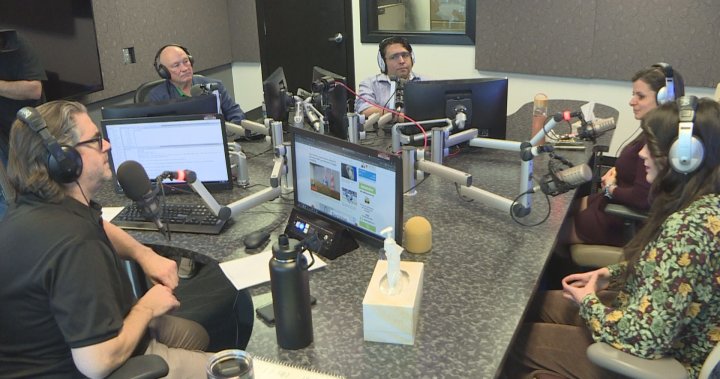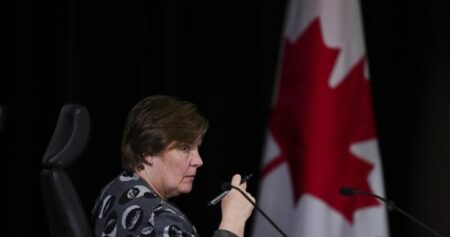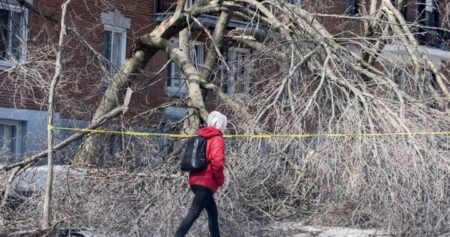Global News and 680 CJOB spoke with four Manitobans on Manitoba’s provincial budget day: what their priorities are, what they are happy to see, and what they think is missing.
Meet Gorete, Craig, Sarah Jane, and Josh.
Gorete Tavares is a single mother of three children. She rents her home, and says her rent has rose $200 per month last year.
“Rent going up, groceries going up, I mean, how are people supposed to live?” she told 680 CJOB Tuesday.
The cost-of-living crisis is affecting her clients, too. As a counsellor, Tavares sees how financial stressors affect mental health — and can prevent people from seeking help.
“I’ve had recently many clients who had to cancel because they just can’t afford it,” she said. She hasn’t increased her prices in five years, and although she could use the money, she said she hopes to be able to serve more people this way.
Craig Whitman has lived in Manitoba most of his life, and is a semi-retired residential real estate appraiser. He lists fixing health care as a top priority, and says government needs to do more to attract health-care workers, including making it easier for foreign-trained professionals to have their credentials recognized.
“I’m older,” he said. “The knees are going to be have to be replaced one day, and hips, and all that other stuff. We can have all the staff or all the building space in the world, but are we still going to be able to access it?”
Whitman considers himself “fiscally conservative” and wants to see the province work to eliminate the $2-billion deficit, calling for “the government to be less reactionary and more proactive,” he told CJOB.
Sarah Jane Martin bought a home with her partner last year, and is expecting a baby. Having heard of other parents’ difficulties finding child care, she approached a friend who works at a child-care centre.
The latest health and medical news
emailed to you every Sunday.
“She said the waitlist is seven years,” she told CJOB.
She’s hopeful one of the 40 new child-care centres promised in the budget will have a space for her kid when they need it. She also supports increasing population density and the number of affordable housing units.
Josh Giesbrecht owns Ashdown Market in Winnipeg’s Exchange District. People from all walks of life come into his store, and Giesbrecht often sees how underfunded social supports have affected his customers’ lives.
“What we see with our regulars is they like just visiting,” he said. “They’re isolated… I find I get a lot out of it, too, not just the monetary side, but also that feeling of, ‘Oh, we’re really building a community here.’”
Giesbrecht says the provincial gas tax holiday has been great for small businesses like his — a leg up at a time when many small businesses are still struggling in a post-pandemic environment.
“I think across Canada, we’re not doing enough to safeguard our middle class,” he told CJOB, “and almost every single small business owner is a middle-class citizen.”
Their budget takes
Tavares, Witman, Martin and Giesbrechet all say mental health care is in serious need of funding in the province. Tavares was pleased to see some help coming in the budget; the province has committed more than $11 million for mental health and addictions services.
“I think that number is probably lower than it should be,” said Tavares. “The public health-care system obviously needed to really be addressed, but equally as important is the mental health. So it’s unfortunate to see the number is a little low, but… it’s a start.”
Giesbrecht agrees.
“I think it’s a good direction, but probably, you know, just scratching the surface of what needs to be done,” he said.
Martin is thrilled a safe consumption site is included in that funding.
“My father, he would be alive today if those facilities were made available,” she said. “To know that they are investing in people and there isn’t that stigma attached. They’re recognizing the issue for what it really is, it’s really instilling a lot of faith in me.”
Martin was also happy with the commitment to support new child-care spaces, as well as $5 million to add staff and improve wages.
“It’s such an important job and the pay is just abysmal,” she told CJOB.
The provincial gas tax holiday will be extended an additional three months.
“I burn a lot of gas in my line of work, going from place to place. It’s going to save me hundreds of dollars,” said Whitman.
Giesbrecht says it helps keep shipping costs for his business down, but he’d also like to see incentives for small businesses, pointing to the City of Winnipeg’s recent move to eliminate fees to open patios as an example.
“It’s not that the government has to directly give small business owners money, but if they can start to lower the fees for what could create more jobs, create more economic opportunity, more spending, I think anything like that would be huge,” he said.
Giesbrecht and Tavares were also happy with the previously announced funds for the search of the Prairie Green landfill.
“I’ve been doing advocacy work for victims of violence for I’d say almost 15 years,” Tavares said. “It’s really nice to see that they are addressing that… people really do need closure.”
All four agree they’re pleasantly surprised by this year’s budget, and feel the province has heard the people’s health care and affordability concerns most of all.’
“They went and listened to the people, which is something we sorely need,” said Whitman.
“I have come to just prepare for the worst,” said Martin, “and I don’t think we got that today.”
Read the full article here












